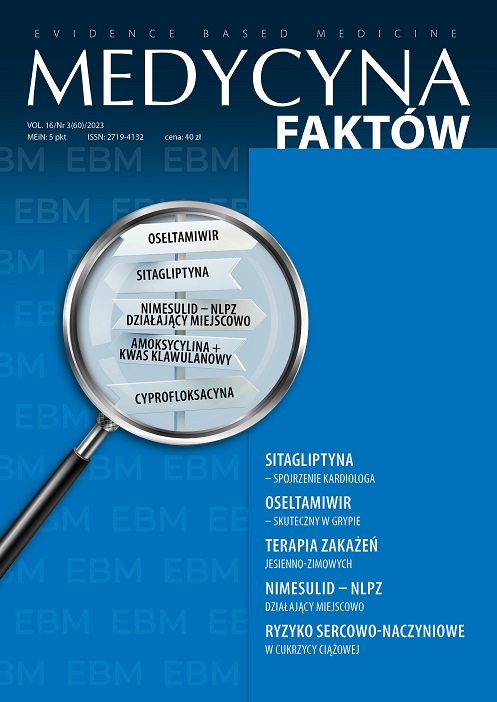Beneficial effect of the combination of butyric acid and probiotics on intestinal dysfunction, including antibiotic therapy Review article
Main Article Content
Abstract
Butyric acid is a natural substance produced in the colon with a broad effect on the intestines – trophic, anti-inflammatory, maintaining the integrity of the intestinal barrier. It is produced with the participation of saprophytic bacteria, so when the intestinal microbiota is disturbed, the amount of butyrate in the intestine decreases. Supplementation with probiotic bacteria, especially Lactobacillus spp., Bifidobacterium spp., can naturally increase butyrate concentration.
Article Details
How to Cite
Waśko-Czopnik, D. (2023). Beneficial effect of the combination of butyric acid and probiotics on intestinal dysfunction, including antibiotic therapy. Medycyna Faktow (J EBM), 16(3(60), 363-366. https://doi.org/10.24292/01.MF.0323.15
Issue
Section
Articles
Copyright © by Medical Education. All rights reserved.
References
1. World Health Organization. WHO report on surveillance of antibiotic consumption: 2016-2018 early implementation. Geneva; 2018.
2. Narodowy Program Ochrony Antybiotyków 2/2015.
3. Levy M, Kolodziejczyk AA, Thaiss CA et al. Dysbiosis and the immune system. Nat Rev Immunol. 2017; 17(4): 219-32.
4. McKenzie YA, Bowyer RK, Leach H et al. British Dietetic Association systematic review and evidence-based practice guidelines for the dietary management of irritable bowel syndrome in adults (2016 update). J Hum Nutr Diet. 2016; 29: 549-75.
5. Gomaa EZ. Human gut microbiota/microbiome in health and diseases: a review. Antonie Van Leeuwenhoek. 2020; 113(12): 2019-40.
6. Cukrowska B. Znaczenie programowania mikrobiotycznego w rozwoju przewlekłych chorób nieinfekcyjnych. Standardy Medyczne. Pediatria. 2016: 1019-28.
7. Karakan T, Ozkul C, Kupeli Akkol E et al. Gut-brain-microbiota axis: antibiotics and functional gastrointestinal disorders. Nutrients. 2021; 13(2): 389.
8. Mc Farland LV. Epidemiology, risk factors and treatments for antibiotic-associated diarrhea. Dig Dis. 1998; 16(5): 292-307.
9. Palleja A, Mikkeelsen KH, Forslund SK et al. Recovery of gut microbiota of healthy adults following antibiotic exposure. Nat Microbiol. 2018; 3(11): 1255-65.
10. Bartlett JG. Clinical practice. Antibiotic-associated diarrhea. N Engl J Med. 2002; 346: 334-9.
11. Kumar LS, Pugalenthi LS, Ahmad M et al. Probiotics in Irritable bowel syndrome: a review of their therapeutic role. Cureus. 2022; 14(4): e24240.
12. Lupu VV, Ghiciuc CM, Stefanescu G et al. Emerging role of the gut microbiome in post-infectious irritable bowel syndrome: a literature review. World J Gastroenterol. 2023; 29(21): 3241-56.
13. Hill C, Guarner F, Reid G et al. Expert consensus document. The International Scientific Association for Probiotics and Prebiotics consensus statement on the scope and appropriate use of the term probiotic. Nat Rev Gastroenterol Hepatol. 2014; 11(8): 506-14.
14. Plaza-Diaz J, Ruiz-Ojeda FJ, Gil-Campos M et al. Mechanism of action of probiotics. Adv Nutr. 2019; 10(suppl 1): S49-S66.
15. Zhang M, Wang Y, Zhao X et al. Mechanistic basis and preliminary practice of butyric acid and butyrate sodium to mitigate gut inflammatory diseases: a comprehensive review. Nutr Res. 2021; 95: 1-18.
16. Seethaler B, Nguyen NK, Basrai M et al. Short-chain fatty acids are key mediators of the favorable effects of the Mediterranean diet on intestinal barrier integrity: data from the randomized controlled LIBRE trial. Am J Clin Nutr. 2022; 116(4): 928-42.
2. Narodowy Program Ochrony Antybiotyków 2/2015.
3. Levy M, Kolodziejczyk AA, Thaiss CA et al. Dysbiosis and the immune system. Nat Rev Immunol. 2017; 17(4): 219-32.
4. McKenzie YA, Bowyer RK, Leach H et al. British Dietetic Association systematic review and evidence-based practice guidelines for the dietary management of irritable bowel syndrome in adults (2016 update). J Hum Nutr Diet. 2016; 29: 549-75.
5. Gomaa EZ. Human gut microbiota/microbiome in health and diseases: a review. Antonie Van Leeuwenhoek. 2020; 113(12): 2019-40.
6. Cukrowska B. Znaczenie programowania mikrobiotycznego w rozwoju przewlekłych chorób nieinfekcyjnych. Standardy Medyczne. Pediatria. 2016: 1019-28.
7. Karakan T, Ozkul C, Kupeli Akkol E et al. Gut-brain-microbiota axis: antibiotics and functional gastrointestinal disorders. Nutrients. 2021; 13(2): 389.
8. Mc Farland LV. Epidemiology, risk factors and treatments for antibiotic-associated diarrhea. Dig Dis. 1998; 16(5): 292-307.
9. Palleja A, Mikkeelsen KH, Forslund SK et al. Recovery of gut microbiota of healthy adults following antibiotic exposure. Nat Microbiol. 2018; 3(11): 1255-65.
10. Bartlett JG. Clinical practice. Antibiotic-associated diarrhea. N Engl J Med. 2002; 346: 334-9.
11. Kumar LS, Pugalenthi LS, Ahmad M et al. Probiotics in Irritable bowel syndrome: a review of their therapeutic role. Cureus. 2022; 14(4): e24240.
12. Lupu VV, Ghiciuc CM, Stefanescu G et al. Emerging role of the gut microbiome in post-infectious irritable bowel syndrome: a literature review. World J Gastroenterol. 2023; 29(21): 3241-56.
13. Hill C, Guarner F, Reid G et al. Expert consensus document. The International Scientific Association for Probiotics and Prebiotics consensus statement on the scope and appropriate use of the term probiotic. Nat Rev Gastroenterol Hepatol. 2014; 11(8): 506-14.
14. Plaza-Diaz J, Ruiz-Ojeda FJ, Gil-Campos M et al. Mechanism of action of probiotics. Adv Nutr. 2019; 10(suppl 1): S49-S66.
15. Zhang M, Wang Y, Zhao X et al. Mechanistic basis and preliminary practice of butyric acid and butyrate sodium to mitigate gut inflammatory diseases: a comprehensive review. Nutr Res. 2021; 95: 1-18.
16. Seethaler B, Nguyen NK, Basrai M et al. Short-chain fatty acids are key mediators of the favorable effects of the Mediterranean diet on intestinal barrier integrity: data from the randomized controlled LIBRE trial. Am J Clin Nutr. 2022; 116(4): 928-42.

